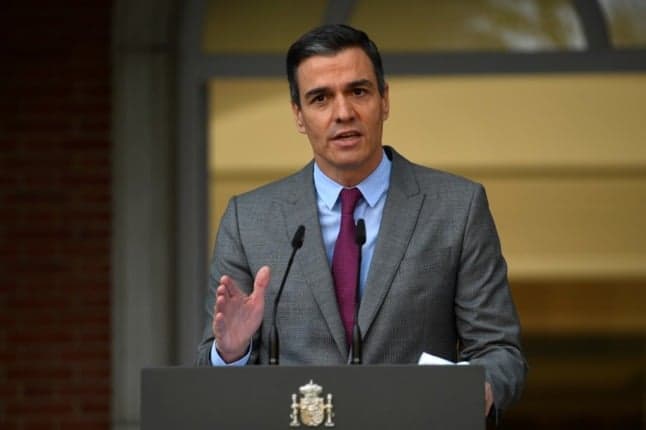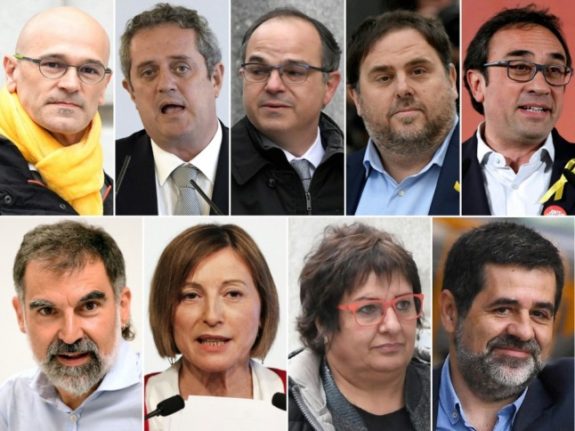CONFIRMED: Spain approves pardons for jailed Catalan separatists

The Spanish government on Tuesday approved the pardons of nine jailed Catalan separatists behind a failed 2017 independence bid as it aimed to break the deadlock over the political crisis in the wealthy northeastern region.
In announcing the decision, Prime Minister Pedro Sánchez said he hoped the move would draw a line under past confrontations with Catalonia's separatist-led regional government and open the way for talks.
"With this act, we want to open a new stage of dialogue and reconciliation and close once and for all the division and confrontation," he said.
The decision to grant clemency to nine separatist leaders who were serving long prison sentences was taken in order to "re-establish coexistence and harmony within Catalan society and Spanish society as a whole," he said.
Although the date of their release remains unclear, media reports suggested it could happen very quickly.
The separatists were convicted over a banned referendum in October 2017 that was marred by police violence and followed by a short-lived declaration of independence, sparking Spain's worst political crisis in decades.
Several fled abroad but 12 others were tried and convicted, with three-quarter of them handed prison terms of nine to 13 years.
Sánchez said they were partial pardons, that all nine would be banned from holding public office and that the pardons would be conditional on them not committing "a serious crime" for a set period of time.
"The Spanish government has taken this decision because it is the best for Catalonia and for Spain," Sánchez said.
But the decision has been attacked by Spain's right-wing opposition as well as by many in the pro-independence camp who want a full amnesty that would allow those who fled abroad to return home.
Analysts have also warned it was a risky political gamble that may help calm tensions but won't solve the years-long turmoil over the separatist crisis, which has left Catalonia sharply divided.

The jailed Catalan separatist leaders (TOP L-R) Raul Romeva, Joaquim Forn, Jordi Turull, Oriol Junqueras, Josep Rull (BOTTOM L-R) Jordi Cuixart, Carme Forcadell, Dolors Bassa and Jordi Sanchez. (Photos by AFP)
A divisive measure
When the separatists were sentenced in October 2019 by Spain's Supreme Court, the ruling triggered an outcry across Catalonia, with thousands hitting the streets in protests that sometimes turned violent.
Sánchez said although the move to grant clemency would directly affect the lives of the nine prisoners, it would also affect "the hundreds of thousands of Catalans who feel solidarity with them" and also many others across Spain "who didn't support their actions but believe they've served enough time".
Although 53 percent of Spaniards oppose the pardons, more than two-thirds -- 68 percent -- of Catalans are in favour, an Ipsos poll found.
The Supreme Court has also opposed the pardons, as have Spain's right-wing opposition parties who accuse Sánchez of playing politics as his minority government relies in part on Catalan separatists for support in the national parliament.
It remains to be seen though if the pardons will drive forward dialogue between Madrid and the Catalan regional government, headed by Pere Aragones, a recently elected moderate separatist from the leftist ERC party.
In the coming weeks, Sánchez will meet for the first time with Aragonès, who is far more open to negotiating than his hardline predecessor, Quim Torra.
Even so, the independence movement is unlikely to give up on its desire for amnesty and to hold a referendum on self-determination -- this time with Madrid's approval.
Both options have been firmly ruled out by Sánchez's government.
"Catalonia without Spain would not be European, nor prosperous, nor plural," Sánchez said on Tuesday.
"Spain without Catalonia simply would not be Spain, just as Catalonia without the rest of Spain would not be Catalonia."
READ ALSO:
Comments
See Also
In announcing the decision, Prime Minister Pedro Sánchez said he hoped the move would draw a line under past confrontations with Catalonia's separatist-led regional government and open the way for talks.
"With this act, we want to open a new stage of dialogue and reconciliation and close once and for all the division and confrontation," he said.
The decision to grant clemency to nine separatist leaders who were serving long prison sentences was taken in order to "re-establish coexistence and harmony within Catalan society and Spanish society as a whole," he said.
Although the date of their release remains unclear, media reports suggested it could happen very quickly.
The separatists were convicted over a banned referendum in October 2017 that was marred by police violence and followed by a short-lived declaration of independence, sparking Spain's worst political crisis in decades.
Several fled abroad but 12 others were tried and convicted, with three-quarter of them handed prison terms of nine to 13 years.
Sánchez said they were partial pardons, that all nine would be banned from holding public office and that the pardons would be conditional on them not committing "a serious crime" for a set period of time.
"The Spanish government has taken this decision because it is the best for Catalonia and for Spain," Sánchez said.
But the decision has been attacked by Spain's right-wing opposition as well as by many in the pro-independence camp who want a full amnesty that would allow those who fled abroad to return home.
Analysts have also warned it was a risky political gamble that may help calm tensions but won't solve the years-long turmoil over the separatist crisis, which has left Catalonia sharply divided.

A divisive measure
When the separatists were sentenced in October 2019 by Spain's Supreme Court, the ruling triggered an outcry across Catalonia, with thousands hitting the streets in protests that sometimes turned violent.
Sánchez said although the move to grant clemency would directly affect the lives of the nine prisoners, it would also affect "the hundreds of thousands of Catalans who feel solidarity with them" and also many others across Spain "who didn't support their actions but believe they've served enough time".
Although 53 percent of Spaniards oppose the pardons, more than two-thirds -- 68 percent -- of Catalans are in favour, an Ipsos poll found.
The Supreme Court has also opposed the pardons, as have Spain's right-wing opposition parties who accuse Sánchez of playing politics as his minority government relies in part on Catalan separatists for support in the national parliament.
It remains to be seen though if the pardons will drive forward dialogue between Madrid and the Catalan regional government, headed by Pere Aragones, a recently elected moderate separatist from the leftist ERC party.
In the coming weeks, Sánchez will meet for the first time with Aragonès, who is far more open to negotiating than his hardline predecessor, Quim Torra.
Even so, the independence movement is unlikely to give up on its desire for amnesty and to hold a referendum on self-determination -- this time with Madrid's approval.
Both options have been firmly ruled out by Sánchez's government.
"Catalonia without Spain would not be European, nor prosperous, nor plural," Sánchez said on Tuesday.
"Spain without Catalonia simply would not be Spain, just as Catalonia without the rest of Spain would not be Catalonia."
READ ALSO:
Join the conversation in our comments section below. Share your own views and experience and if you have a question or suggestion for our journalists then email us at [email protected].
Please keep comments civil, constructive and on topic – and make sure to read our terms of use before getting involved.
Please log in here to leave a comment.